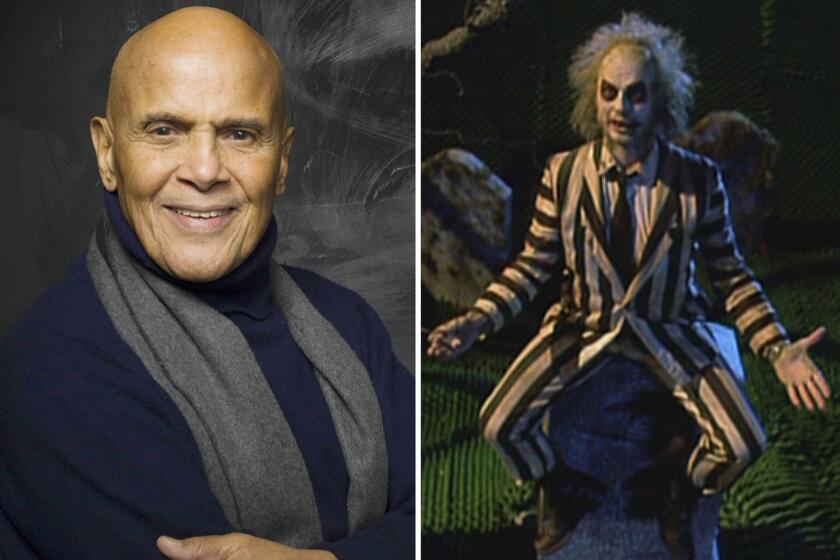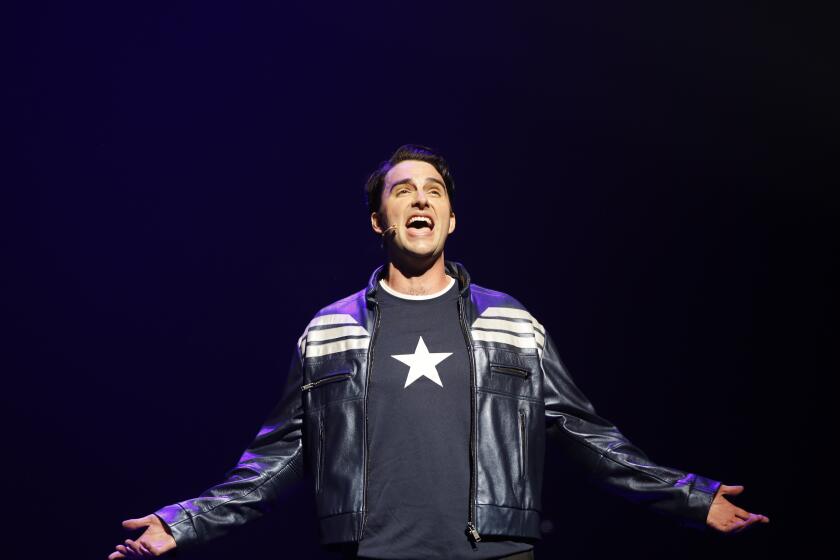How the ‘Beetlejuice’ musical beat bad reviews and became a Gen Z hit
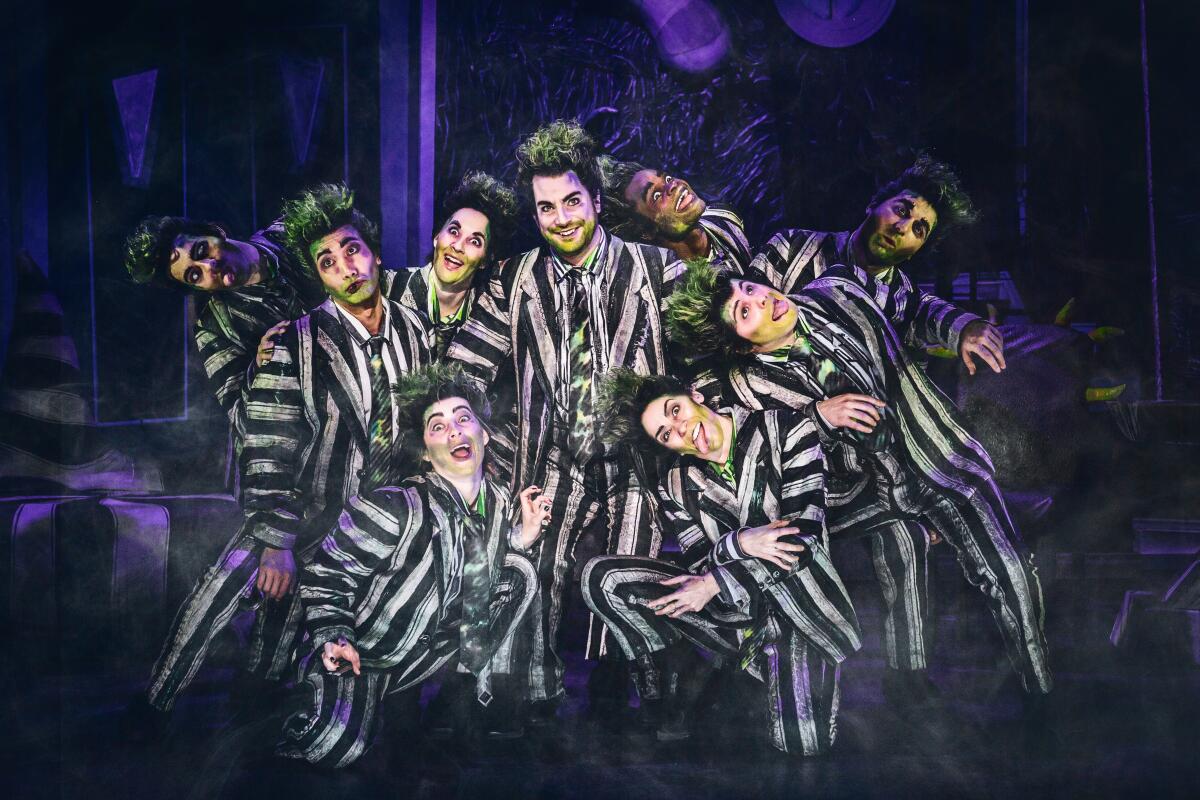
- Share via
When “Beetlejuice” opened on Broadway in 2019, it received numerous negative reviews from major publications. “Absolutely exhausting,” wrote the New York Times. “Dismal and gross,” noted the New York Post. The “most cacophonous and ill-conceived musical of the season — in fact, for several seasons,” said the Chicago Tribune. It earned eight Tony nominations but won none.
Usually, this lack of enthusiasm from notable theater critics and Tony voters can swiftly shutter a stage show, no matter how beloved its source material. But the adaptation of the Tim Burton horror comedy organically fostered a devout fan base in younger theatergoers, and went on to break box office records and even reverse its closing notice with a months-long post-COVID-19 pandemic run. At performances on Broadway and now on tour, these fans show up in black-and-white striped suits and bright green hair or fitted red dresses and “Miss Argentina” sashes.
So how did “Beetlejuice” pull off the rarity of coming back from near-death and becoming one of the most popular musical properties among younger theatergoers, an elusive demographic for many new shows?
A thorough dissection of the musical, currently playing at the Hollywood Pantages Theatre through July 30, yields its winning strategy: Its storytelling sacrifices nostalgia for the new, specifically in ways that align with Gen Z. It’s a risk for a screen-to-stage adaptation to not cater to the same audience that applauded its source material when it debuted; yet because of the authenticity and precision of its creative choices, it continues to pay off, especially at a time when the American theater is in crisis.
Tim Burton’s 1988 classic ‘Beetlejuice’ memorably used recordings of Harry Belafonte’s ‘Day-O’ and ‘Jump in the Line,’ much to the late entertainer’s delight.
The show practically announces this bold plan the moment the curtain rises, revealing a teenage girl at a funeral. Unlike the 1988 film, which centers on a suburban couple who want to stay in their home after their sudden death, the musical — with a book by Scott Brown and Anthony King — focuses on Lydia Deetz, the daughter of the family that then moves into the house.
This Lydia resonates with younger audiences not because she drops hollow buzz words but rather because she is wholly realized as a Gen Z protagonist: clever, socially aware, reasonably nihilistic and emotionally honest. And in comparison to her father, his girlfriend and numerous other characters, Lydia is pragmatic, clear-eyed and merely misunderstood, a feeling any younger theatergoer likely knows well.
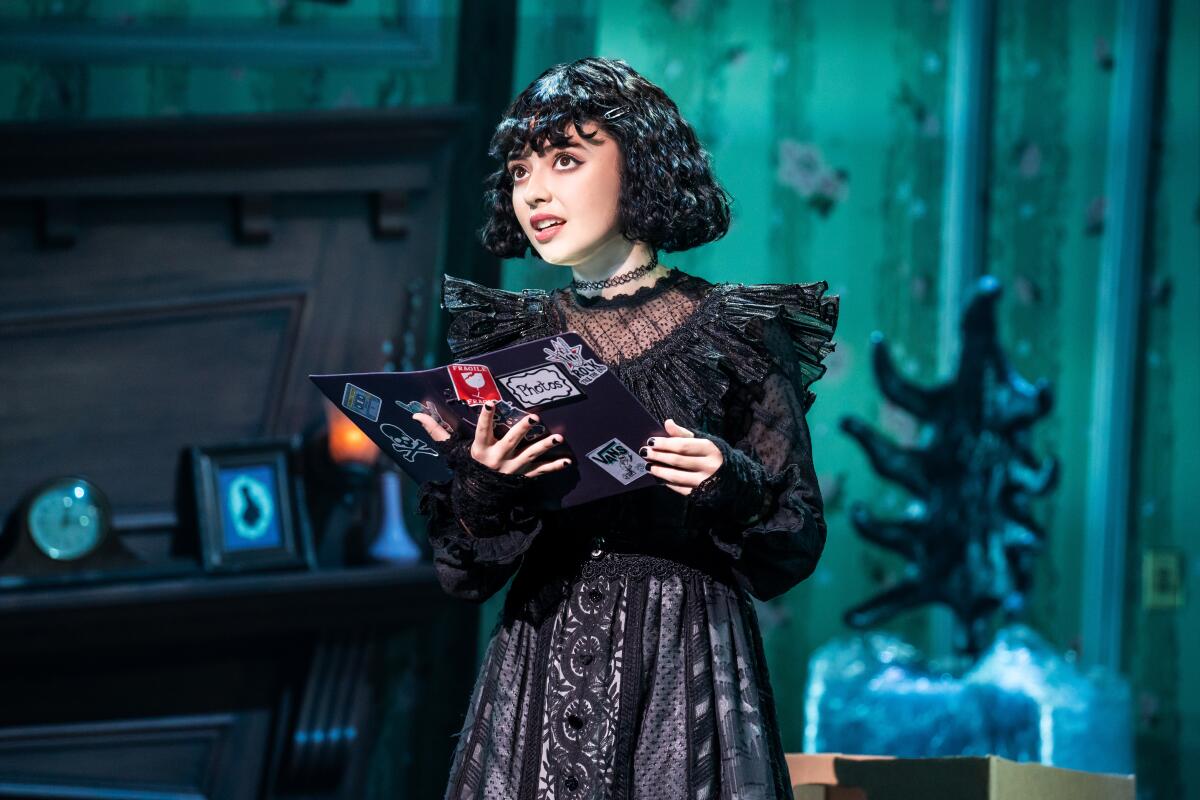
Fans of the film might be perplexed by the narrative’s reframing around Lydia, since the role onscreen, played by Winona Ryder, was more of a supporting part with a quirky curiosity about death. Onstage, her obsession with the afterlife is insightfully tied to the recent death of her mother — a pivot that makes Lydia the impetus for the story’s momentous events (the movie’s iconic “Day-O” dinner takeover is now her idea, and she chooses to say Beetlejuice’s name for her own gain) as well as its emotional heart.
The show’s only ballads explore the depths of her overwhelming grief; in the touring production, Isabella Esler performs them both with palpable vulnerability, filling the otherwise empty stage with Lydia’s frustrations about mourning her mother alone while her father refuses to acknowledge the loss.
“Holy crap … such a bold departure from the original source material!” Beetlejuice shouts of the show’s Lydia focus. The titular demon, famously played by Michael Keaton for only around 15 minutes of the movie, is given lots more stage time as the charismatic narrator of the musical. By making this joke at the very top of the show, he immediately declares its comedic sensibilities — meta, profane and refreshingly irreverent about its esteemed IP — and doubles down with an opening number packed with jabs about the universal inevitably of dying, the musical theater canon and the theater setting itself: “I do this bull— like eight times a week. So just relax, you’ll be fine, drink your 50 dollar wine and take a breath, welcome to a show about death.”
‘Rogers: The Musical,’ Disney’s new Captain America-inspired musical, started as a joke in a Disney+ series and now is part of the resort’s big summer offerings.
Beetlejuice, played at the Pantages by a tireless Justin Collette, sings this song with a gravelly voice and a devilish smile, occasionally flipping off the audience and simulating snorting a massive amount of cocaine. As directed by Alex Timbers, his character’s sheer volume of jokes per minute throughout the musical — some of which involve a cheer squad, a gospel choir and a faux game show — are fired off at a steady clip akin to Keaton’s fast-talking dialogue onscreen. It’s a pace to which the Internet age is accustomed, even while delivered amid strobe lights, fog machines and sand-worm puppetry.
Musically, “Beetlejuice” might initially seem frenetic because its overall sound pulls from so many disparate genres. But a closer listen to Eddie Perfect’s music and lyrics reveal that, beyond the film’s signature Harry Belafonte songs “Day-O (The Banana Boat Song)” and “Jump in the Line (Shake Señora),” both of which are ensemble-wide act-closers onstage, the show’s songs are classified by the character performing them.
For example, Lydia’s angsty anthems echo the grunge and pop-punk hits of the ’90s and the aughts, while Beetlejuice’s tunes are more reminiscent of ’70s and ’80s rock songs. And Miss Argentina leads a lively tango in the Netherworld, featuring cameos by the movie’s other memorable undead characters. That the score is a composite of multiple, distinct genres also nods to how Gen Z listeners’ tastes tend to be more diverse and wide-ranging.
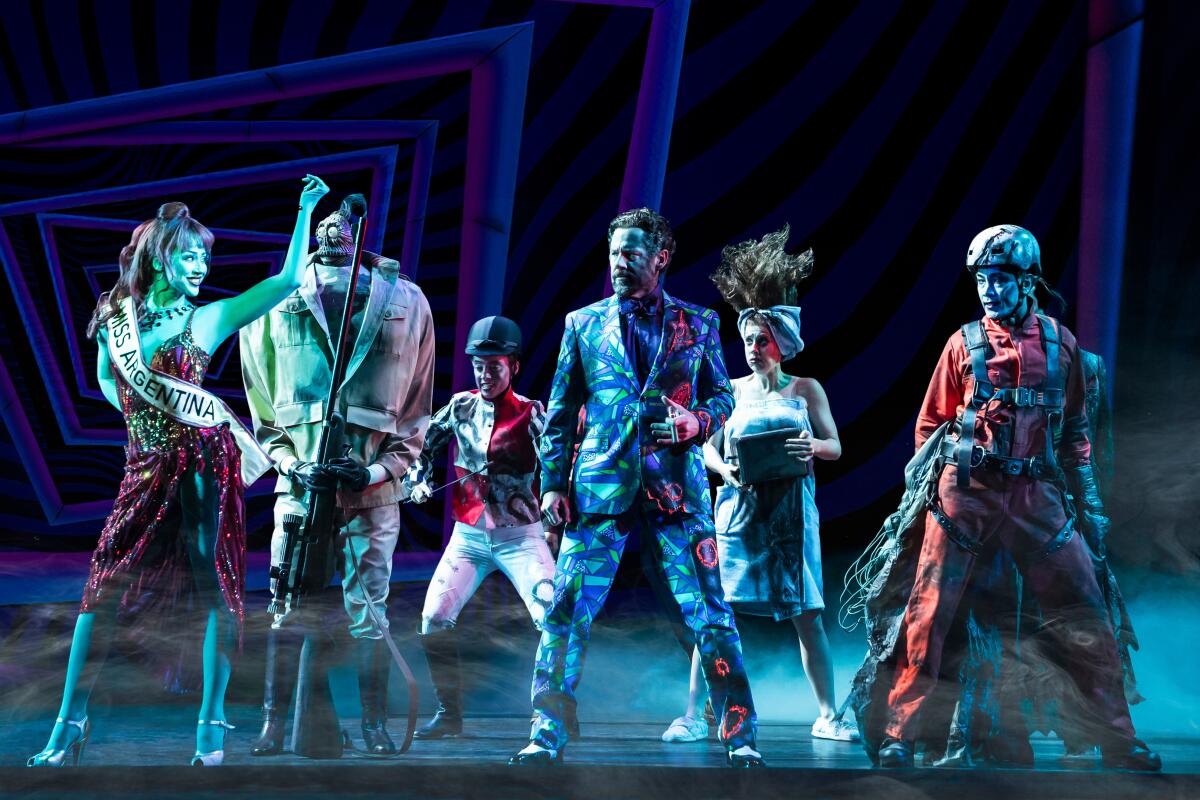
Months after opening on Broadway, “Beetlejuice” found a fandom in a younger generation thanks to a perpetual virality on TikTok, with users reenacting animated lip syncs to the musical’s songs and cast members participating in the platform’s latest trends from backstage. The production also put on an unconventional Tonys musical performance and regularly hosted costume contests, virtually and in person.
Such post-opening marketing efforts wouldn’t be as effective if the show itself didn’t already have the inherent potential to resonate with this audience. Theatermakers of upcoming screen-to-stage adaptations, especially those beloved by a different generation, should consider prioritizing a younger one, as “Beetlejuice” did. It might just save that show from the brink of death.
‘Beetlejuice’
Where: Hollywood Pantages Theatre, 6233 Hollywood Blvd.
When: 8 p.m. Tuesdays to Fridays, 2 and 8 p.m. Saturdays, 1 and 6:30 p.m. Sundays. Ends July 30
Cost: $39-$225 (subject to change)
Info: (323) 468-1700, broadwayinhollywood.com
Running time: 2 hours and 30 minutes, with one intermission
Also in Costa Mesa:
Where: Segerstrom Center for the Arts, 600 Town Center Drive.
When: April 16-28, 2024. 7:30 p.m. Tuesdays to Fridays, 2 and 7:30 p.m. Saturdays, 1 and 6:30 p.m. Sundays
Info: 714-556-2787, scfta.org
More to Read
The biggest entertainment stories
Get our big stories about Hollywood, film, television, music, arts, culture and more right in your inbox as soon as they publish.
You may occasionally receive promotional content from the Los Angeles Times.
